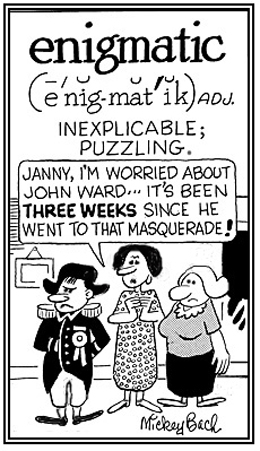enigma-
(Greek ainigma > Latin aenigma: dark saying, riddle, fable; from ainissesthai, "to speak darkly, to speak in riddles")
2. A perplexing, obscure, mysterious, or unintelligible speech or behavior: Just why the governor suddenly switched political parties remains an enigma to everyone who knew him.
3. Anything that cannot be comprehended or determined: The veterinarian was finally able to solve the enigma of the dog's sudden death.
The enigma of the man's weird behavior could not be explained because no one had any idea why he was doing such silly things as hiding behind a wall.
4. Etymology: borrowed from Latin aenigma, "riddle"; from Greek aninigma, ainigmatos which came from ainissesthai, "to speak allusively or obscurely; to talk in riddles".
Go to this Word A Day Revisited Index
so you can see more of Mickey Bach's cartoons.
For some enigmatic reason, the politician was reelected despite all of the criticism about her policies.
2. Etymology: in the early 17th century, from French enimatique which was borrowed from Latin aenigmaticus and possibly based on Greek ainigma, "riddle".
Go to this Word A Day Revisited Index
so you can see more of Mickey Bach's cartoons.
One question written by the enigmatist was: "Why did Sam get a job at the bakery? Because he kneaded dough".
2. Written publications about unexplainable happenings or circumstances: Several enigmatographers presented some difficult issues about human life.
Will Shortz is the senior editor of Games magazine and puzzlemeister on National Public Radio's "Weekend Edition". At Indiana University, he became the first and only person to major in puzzles and, in 1974, to receive a degree in enigmatology.
2. The system of making riddles or the skills used in solving them: Enigmatology involves the investigation of, or the science of, puzzle creations and their solutions.Additional information about Will Shortz and Enigmatology
By the age of 15, Shortz was already writing a puzzle book, and selling his work to national magazines. His fascination with puzzles continued into college where, through the independent learning program at the University of Indiana, he created his own college curriculum in enigmalology. "The people at IU were pretty skeptical at first," Shortz said, "but they came around."
Shortz was able to find professors who were willing to work with him on courses of his own devising, in various disciplines, all related to puzzles. He obtained his degree in 1974, after completing courses such as "Creation of Mathematical Puzzles", "Word Puzzles in the 20th Century", and "The Psychology of Puzzles".
His thesis, on "American word puzzles before 1860", was published in a national journal of recreational linguistics.
In addition to his puzzle constructions and solutions, Shortz has also established a collection of puzzle-related books and magazines. He is said to have over 3,000 of them, dating back to the 18th century.
Puzzles "appeal to my mind," Shortz said, in describing why his childhood hobby became the focus of his life. "I love to think and exercise my brain. Puzzles are very satisfying because they take you into almost every other field of endeavor, and you learn something about history, art, music, or any subject you can think of."
